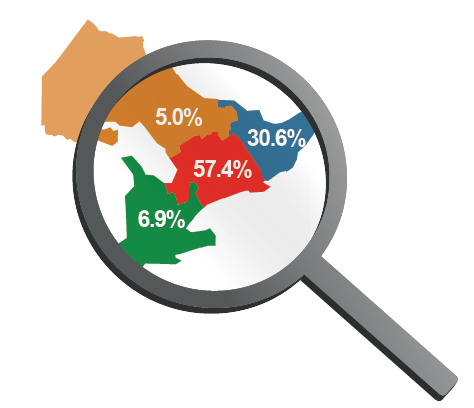
COVID-19 pandemic response
From crisis response to recovery planning
We remain committed to supporting service providers and agencies as we collectively emerge from the pandemic and work together to address challenges, old and new. Ever evolving client needs, new working realities and service provider well-being are top of mind as recovery continues.
New webinar series: Spotlight on COVID-19 recovery
This webinar series brings together agency leaders, clinicians, young people, family members and other experts to explore key issues our sector is facing as we begin to emerge from the pandemic. Selected topics correspond with our sector’s most pressing needs, as determined by a sector-wide survey and other consultations with service providers. See Additional resources below for recordings of previous webinars in this series.
Understanding the impact on young people and families
From the outset, we saw that provincial and federal measures to slow the spread of COVID-19 would have a significant impact on the daily lives of Ontario’s children, young people and families. That’s why we launched a research project with the CHEO Research Institute to better understand the impacts and how we — and others in our sector — could better support children, young people and families during and after the pandemic.
One year later, we took the research a step further to check in on how young people were doing, what mental health services and supports they had accessed since the beginning of the pandemic and how these services could be improved.
Here’s what we learned from what young people, parents and caregivers had to say:
Additional resources
The following evidence summaries and resources were compiled and developed to support agencies’ and service providers’ unique information needs throughout the pandemic.
Want to be notified when we add new resources to this page? Click the "Subscribe to page updates” button to receive email notifications. Your email address will not be used for any other purposes.
Evidence summaries
| Resilience in a hybrid workspace (October 2022) |
|
As leaders and teams learn how to navigate the “new normal” in hybrid workspaces, resilience is top of mind. But what does resilience really mean and how can organizations achieve it? This resource highlights evidence-based guiding principles, strategies and emerging practices to support well-being and resilience through unexpected events or changes, in the context of a hybrid workplace. This includes organizational policies, digital transformations and redesigned workspaces. Looking for clarity on what “hybrid” means in the child and youth mental health and addictions context? We’ve got a primer that digs into what constitutes hybrid work, the benefits and challenges it presents and what’s unique about hybrid work in our sector. |
| How to lead teams in a hybrid workspace (August 2022) |
|
One thing that will likely never return to the pre-pandemic normal is the way we work. Hybrid models come with many benefits, including opportunities to improve work-life balance. But the transition also presents unique and complex challenges for many leaders, who struggle to feel connected with their teams. How can leaders take on the opportunities and challenges of these new working realities to help their teams to thrive? This resource provides evidence-based tips for leading in a hybrid workspace, from planning intentional and flexible models to fostering psychological safety. It also highlights considerations to optimize hybrid meetings and sector secrets — what others are doing that is working well. Looking for clarity on what “hybrid” means in the child and youth mental health and addictions context? We’ve got a primer that digs into what constitutes hybrid work, the benefits and challenges it presents and what’s unique about hybrid work in our sector. |
| The impacts of COVID-19 on child and youth mental health (February 2022) |
|
This is a companion to our July 2020 evidence summary looking at the impacts of COVID-19 on child and youth mental health. As the pandemic wears on, peer-reviewed literature on the topic progresses. Continuing to deepen our understanding of the impacts can help service providers best prepare for and meet client needs and guide evidence-based decision making for the sector. This document explores the most recent evidence, drawing from peer-reviewed and grey literature published in 2020 and 2021. Findings are organized thematically by mental health challenge. |
| Mental health impacts of screen use for children and young people (August 2021) |
|
Physical distancing measures pushed a lot of education, socialization and recreation online, meaning many children and young people have been spending six or more hours a day on screens throughout the pandemic. But even before, a lot of them were already exceeding guidelines and recommendations for screen time use. This document summarizes the latest evidence on the mental health impacts of screen use and highlights ways screen time can be managed to reduce negative effects. |
| Additional evidence summaries |
|
Webinars
| Putting evidence into practice: Knowledge mobilization beyond COVID-19 (March 2022) |
|
Over the past three years, our sector has learned how to put knowledge in action in the face of the COVID-19 pandemic, leveraging new ways to share research, best practices and guidance to shape service access and delivery for children, young people and families. This webinar brought together sector partners to discuss innovative knowledge mobilization initiatives that are improving mental health and addictions service access and delivery in the pandemic recovery state and beyond. Panelists shared their approaches to knowledge mobilization, as well as successes and lessons learned from the COVID-19 pandemic. |
| Growing up and through the pandemic: Supporting young people through life transitions (October 2022) |
|
Big milestones and life transitions are exciting for most young people, but they can also be stressful and challenging — even under the best of circumstances. New graduates are entering the workforce or starting post-secondary, some returning in person for the first time since the beginning of the pandemic and facing more unique circumstances and challenges. For this webinar, we were joined by friends from Children’s Mental Health Ontario, School Mental Health Ontario, the Centre for Addiction and Mental Health (CAMH) and Youth Wellness Hubs Ontario (YWHO) to explore recent lived experiences, current mental health and addictions needs and emerging initiatives to support young people and their families in both school and community contexts. |
| Building routines, rituals and resilience in a hybrid workspace (June 2022) |
|
Over the past couple of years, resilience has often meant “just deal with it” or “just pivot”, but that’s not sustainable long-term. What does it mean to engage in resilience-building post-pandemic? What misconceptions and barriers do leaders face? How can developing routines and rituals improve team culture and build a healthy workforce that is best prepared to support children, young people and families? This webinar, offered in collaboration with Children’s Mental Health Ontario, explored these questions and more, including how developing routines and rituals that meet the needs of diverse teams can improve team culture and build healthy workforces that can, in turn, best support children, young people and families. Panelists included sector leaders and subject matter experts sharing effective strategies, best practices and recommendations. |
| Leading in a hybrid workspace: Moving our teams from surviving to thriving (May 2022) |
|
All facets of our lives have undergone big changes over the past couple of years, including how we interact and work with our colleagues. Our sector has not only transitioned to a hybrid service delivery model, but also a hybrid workspace. This webinar, offered in collaboration with Children’s Mental Health Ontario, explored what exactly we mean by "hybrid" and the learning curves leaders have faced in ensuring teams thrive in a hybrid workspace. Panelists included sector leaders and subject matter experts sharing effective strategies, best practices and recommendations for adapting leadership styles in a hybrid landscape. |
| Additional webinars |
|
Peer-reviewed publications
| Families, Systems & Health, March 2022 |
|
Article title: Parenting during the COVID-19 pandemic: The sociodemographic and mental health factors associated with maternal caregiver strain Abstract: The COVID-19 pandemic has introduced new stressors for parents (“caregivers”) that may affect their own and their child’s mental health. We explored self-reported levels of caregiver strain (parents’ perceived ability to meet parenting demands), and the mental health and sociodemographic factors of caregivers to identify predictors of strain that can be used to guide mental health service delivery for families. Over 75% of participants reported “moderate-to-high” caregiver strain. More than 25% of caregivers rated their mental health as “poor” and 20% reported moderate-to-severe anxiety. We found a relationship between child age, child and caregiver mental health variables and caregiver strain. Given the interrelatedness of these factors, supporting caregivers’ mental health and lessening their role strain becomes critical for family well-being. Evidence-based individual, family and public health strategies are needed to alleviate pandemic-related strain. |
| JAMA Pediatrics, February 2022 |
|
Article title: Utilization of Physician-Based Mental Health Care Services Among Children and Adolescents Before and During the COVID-19 Pandemic in Ontario, Canada Abstract: Public health measures to reduce the spread of COVID-19 have heightened distress among children and adolescents and contributed to a shift in delivery of mental health care services. The main objectives of this study were to measure and compare physician-based outpatient mental health care utilization before and during the COVID-19 pandemic and quantify the extent of uptake of virtual care delivery. We found that physician-based outpatient mental health care in Ontario increased during the pandemic, accompanied by a large, rapid shift to virtual care. There was a disproportionate increase in use of mental health care services among adolescent female individuals. System-level planning to address the increasing capacity needs and to monitor quality of care with such large shifts is warranted. |








